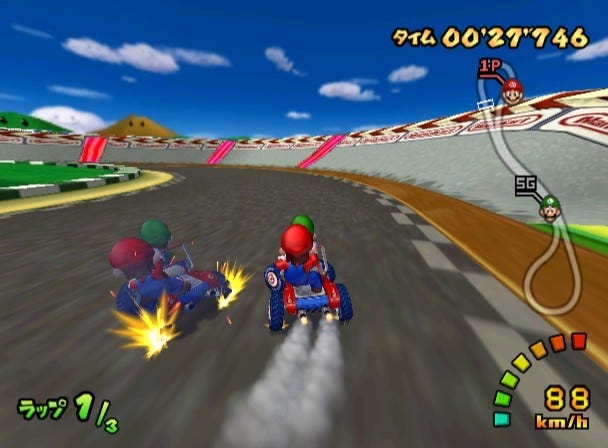Tuesday's Rule #4
Your Competition
Write for yourself.
This is advice I've seen repeatedly for improving as a writer.
So, I'm being selfish today. This week’s rule is directed squarely at me, myself and I.
I've always been competitive.
Looking back at my life so far, I'm pretty sure it comes down on the side of being a net positive, but there are definitely occasions where it irritates my loved ones.
Christmas game? Quiz night? Trip to the supermarket?
I always find it hard to not turn these into competition.
Fun for me, infuriating for my fiancee, who just wants to shop without me throwing items into the trolley from a further and further distance.
The rule is not to stop or to altogether avoid being competitive.
It's about harnessing competitiveness in a way that will have the maximum benefit and eliminating it from where it becomes a hindrance.
The rule is:
The best version of yourself is the only person you should be competing with.
As I said, I'm confident my competitiveness has had a net positive impact on my life so far. Competition is motivating and should be sought out.
It has been good for my career as I've sought to progress and stretch myself against peers and people around me. My competition has spurred me on to work harder and do more. When I've been working towards promotions, knowing others are fighting for the same spot gives me focus. It encourages me to do what needs to be done.
How can that not be a positive?
But it's something to consider working on when it ruins a game of golf with my dad, leaving me frustrated when he beats me rather than grateful for some quality time with him.
It also only goes so far, as whatever you do in life, there will always be someone a little more successful, a little more refined and a little further ahead. It also flies in the face of TR #2 - controlling your controllables.
So, competing with others has limits. But, used correctly, that competitiveness within you can still be hugely impactful.
And one application of that is competing with yourself.
This isn't a new idea. And I'm acutely aware that this risks coming close to the line of slightly cringeworthy "self-improvement" talk.
But, I think this framing of rule is particularly powerful because of the two parts to it.
Firstly, it forces you to define the best version of yourself.
Thinking about what you should have done or what your best version would have done when looking back is easy. Chances are, if we've made wrong decisions or acted in ways that have led to unfavourable outcomes, we don't need others to point out what we could or should have done differently.
But hindsight is 20/20. How do we know what they would do moment to moment or when looking ahead?
Again, actually, when you allow yourself the chance to, it is surprisingly easy.
When we examine ourselves, chances are that slowing down and pausing will lead us to understand the right thing to do. Or at least understand the wrong things, the things to avoid.
Acting in service of your future self is worth exploring in more detail, and it will be featured more directly in Tuesday's Rule in the coming weeks.
But think about it.
Personally, if I picture a goal I have or something I want to achieve and I really think about it, I know exactly what I should be doing in service of that.
The challenge, therefore, is two-fold. Creating the space to consider what your best version would be doing and then actually doing it.
This is where the second part of the rule comes in. Competing with that version of yourself that you've just defined.
The framing of it can gamify and leverage your competitive nature to ensure you are doing what you already know you should be doing.
Like a game of Mario Kart, racing against a shadow version of yourself, representing your record fastest lap.
If you want to get in shape, the easy part is setting an alarm to wake up early and go to the gym.
Getting up, going, and putting in a meaningful workout? Sounds like something the best version of yourself would be doing.
Sitting down for 30 minutes extra, researching and finessing the blog before posting?
Definitely, something the best version of me would be doing. And I don't like losing to anyone... not even to that guy.
After writing that last sentence, I paused and thought about the idea of "losing" to the best version of myself.
By definition, the best version of myself is exactly that. The best. He should be impossible to beat over the long term.
Improving versus where you were yesterday is one thing, constantly keeping a future “best version of yourself” in mind, is another.
In Matthew McConaughey's Oscar speech in 2014, he talks about his hero.
His hero, he says, is himself in 10 years.
"Every day, every week, every month, and every year of my life, my hero is always 10 years away.
I'm never going to beat my hero. I'm not gonna attain that. I know I'm not! That's just fine with me, because it keeps me with somebody to keep on chasing."
So, what would the best version of yourself do today? That's who you want to compete with. Not always to beat, but to try and keep pace with.
If I do that, and it happens to come with the added bonus of beating my dad at golf, I'll take that, too.


